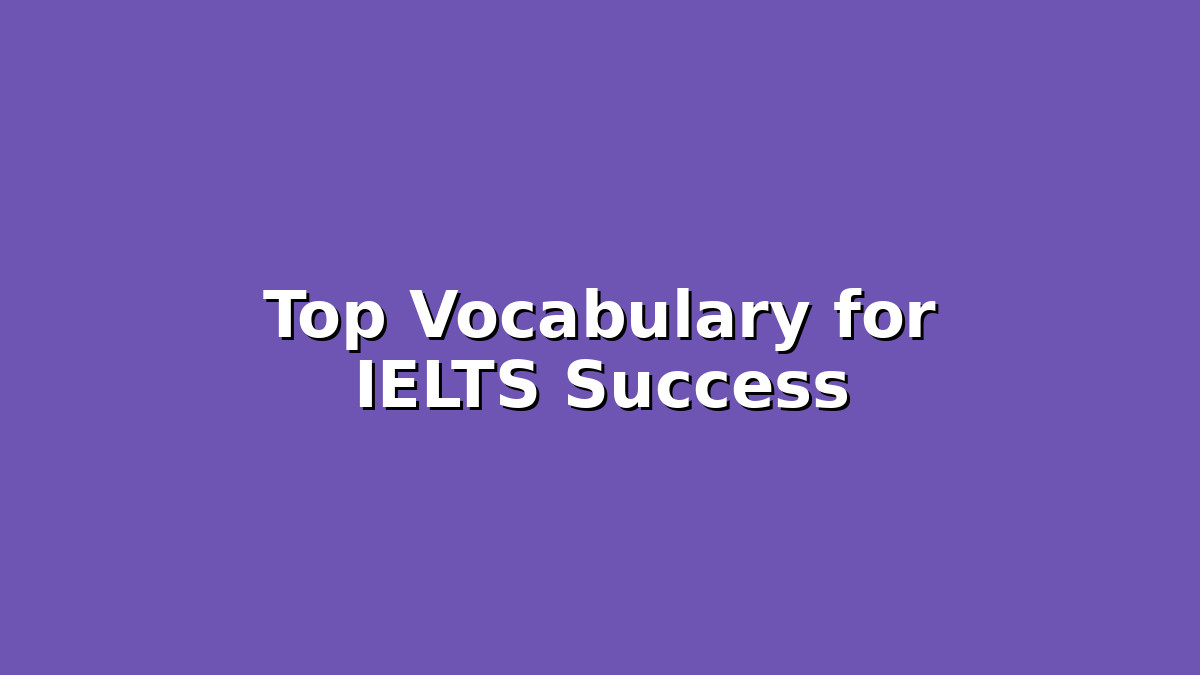Preparing for the IELTS exam can feel overwhelming, especially when it comes to building the right vocabulary. Vocabulary is a key component of your IELTS success because it influences your performance in all four sections: Listening, Reading, Writing, and Speaking. Having a strong, versatile vocabulary helps you understand questions better, express ideas clearly, and achieve higher scores. In this article, we’ll explore the top vocabulary you need to master for IELTS success, along with practical tips on how to study and use these words effectively.
1. Essential Academic Vocabulary for IELTS
One of the biggest challenges students face in IELTS is adapting to the formal, academic style required, especially in Writing and Reading tasks. The exam often includes topics related to education, environment, technology, health, and society. To perform well, you need a solid grasp of academic vocabulary that is both precise and varied.
Key Vocabulary Themes:
– Education: curriculum, assessment, literacy, pedagogy, enrollment
– Environment: sustainability, pollution, conservation, renewable, biodiversity
– Technology: innovation, automation, artificial intelligence, digitalization, cybersecurity
– Health: epidemic, nutrition, immunity, therapy, morbidity
– Society: inequality, demographics, migration, legislation, community
Study Tips:
– Create Topic-Based Word Lists: Organize vocabulary by common IELTS themes. This helps you remember words in context and apply them more naturally.
– Use Flashcards: Digital apps like Anki or Quizlet can be great for memorizing definitions, synonyms, and example sentences.
– Read Widely: Academic articles, opinion pieces, and reports from reliable sources like BBC, The Guardian, or National Geographic introduce you to relevant vocabulary in context.
Building a strong academic vocabulary not only improves your comprehension but also enables you to write and speak more confidently.
2. Power Verbs, Adjectives, and Connectors to Enhance Your Writing and Speaking
In IELTS Writing and Speaking, your ability to convey ideas clearly and persuasively is crucial. Using dynamic verbs, descriptive adjectives, and linking words can make your language more engaging and coherent.
Power Verbs:
Instead of basic verbs like “do,” “make,” or “get,” try more specific alternatives:
– Analyze (instead of “look at”)
– Demonstrate (instead of “show”)
– Contribute (instead of “help”)
– Reflect (instead of “think about”)
– Emphasize (instead of “stress”)
Useful Adjectives:
Adjectives add color and precision to your descriptions. For IELTS, academic and formal adjectives are best:
– Significant, substantial, considerable (to describe amounts or effects)
– Innovative, advanced, modern (for technology and ideas)
– Challenging, complex, demanding (to describe problems or tasks)
– Beneficial, effective, efficient (to describe positive outcomes)
Connectors and Cohesive Devices:
Linking words help structure your ideas logically. Common IELTS connectors include:
– Addition: furthermore, moreover, in addition
– Contrast: however, on the other hand, nevertheless
– Cause and Effect: therefore, as a result, consequently
– Example: for instance, such as, to illustrate
Study Tips:
– Practice Writing with New Vocabulary: Try writing paragraphs or essays using the new verbs, adjectives, and connectors. This helps you internalize their usage.
– Record Yourself Speaking: Use power verbs and connectors during practice speaking tests. Listening back will help you notice areas to improve.
– Use Vocabulary in Context: Don’t just memorize words; write sentences or short stories that use these words naturally.
Mastering these words and phrases can elevate the quality of your writing and speaking, impressing IELTS examiners.
3. Common Collocations and Idiomatic Expressions for Fluency
Collocations are word pairs that commonly appear together, such as “make an effort” or “take a risk.” Using collocations correctly can make your English sound more natural and fluent, which is especially important for the Speaking and Writing sections.
Examples of Useful Collocations:
– Make progress
– Take responsibility
– Have an impact
– Raise awareness
– Conduct research
Idiomatic Expressions:
While idioms should be used sparingly and appropriately in IELTS, a few well-chosen expressions can demonstrate language proficiency and variety:
– Break the ice (to start a conversation comfortably)
– Hit the nail on the head (to be exactly right)
– A blessing in disguise (something that seems bad but is good)
– Costs an arm and a leg (very expensive)
– On the same page (in agreement)
Study Tips:
– Learn in Context: Read or watch materials that use collocations and idioms naturally, such as podcasts, movies, or books.
– Practice Speaking: Use new collocations and idioms in your daily speaking practice. This builds confidence and fluency.
– Avoid Overuse: Use idiomatic expressions carefully—don’t force them into academic writing, but they can be useful in speaking to show natural language ability.
Using collocations and idioms appropriately can help you sound more like a native speaker and increase your fluency score.
Conclusion
Achieving IELTS success isn’t just about knowing English grammar or practicing old test papers — it’s about building a rich, varied vocabulary tailored to the exam’s demands. Focus on mastering academic vocabulary, power verbs, adjectives, connectors, collocations, and idiomatic expressions. Use practical study methods like topic-based lists, flashcards, reading real-world materials, and speaking practice. Remember, vocabulary develops gradually with consistent effort, so stay patient and motivated.
By enriching your vocabulary and practicing using it confidently, you’ll be well on your way to achieving the band score you desire. Keep practicing, keep learning, and believe in your ability to succeed!

Responses